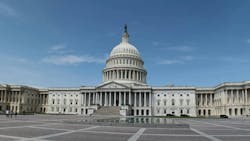Congress voted to eliminate the EPA waivers for California’s Advanced Clean Trucks and Heavy-Duty Omnibus regulations.
The votes on May 22 are a major development in the federal government’s work to overturn heavy-duty emissions regulations set by the California Air Resources Board.
Congress used the Congressional Review Act to revoke the waivers that allow states to enforce the ACT and Omnibus regulations. Outside California, 10 other states adopted ACT, CARB’s heavy-duty electric vehicle mandate, and nine states adopted Omnibus, CARB’s latest stringent heavy-duty emissions standards.
“Both mandates are untethered from reality and would have been extraordinarily costly to fully implement,” the American Trucking Associations said, celebrating the votes. “Even states that adopted the standards are acknowledging reality by scaling back and delaying implementation.”
See also: FMCSA to begin English tests during roadside inspections
Once President Donald Trump signs the two resolutions, they will nullify CARB’s waivers and prohibit EPA from issuing similar waivers in the future. There is one catch, however: Once the resolutions pass the president, they will face challenging lawsuits that could take several months to resolve.
Trucking industry groups celebrate
Beyond ATA, several other major industry organizations applauded the Senate’s action against CARB waivers.
“The repeal of these poorly planned measures is a testament to the voice that our membership has provided and the resolve of our industry to tell our story,” David Heller, Truckload Carriers Association senior VP of safety and government affairs, wrote in a letter to his membership after the votes. “As a major issue during TCA’s 2024 Call-on-Washington, we emphasized the very notion that these rules would have been crippling to our nation’s supply chain and an obstacle to an industry that thrives on delivering a nation.”
American Truck Dealers also applauded the repeal. “The importance of these critical votes cannot be overstated,” Jacqueline Gelb, president of the trade group, said. “California’s onerous regulations have upended the trucking industry in CARB states through rationing of diesel trucks and forcing adoption of zero-emission technologies that don’t meet the performance and durability requirements for the industry."
As other trucking groups have noted over the years, Gelp said the industry has already improved diesel emissions through better technology and more efficient designs in recent decades.
Calstart, an industry organization focused on decarbonizing transportation, blasted the move in a news release, calling the overturned regulations “foundational tools for accelerating clean vehicle innovation.”
“In a massive handout to special interests, the Senate today took a radical action that creates enormous policy uncertainty for the entire transportation industry,” John Boesel, Calstart president and CEO, said. “This move concedes the industries of the future to global competitors, will increase air pollution, accelerate global warming, and result in significant job loss.”
He said the vote upends decades of policy that created cleaner air and transportation industry growth. “It is a brazen, yet futile, attempt to bring the clean transportation industry to a sudden halt,” he added. “Calstart will continue to partner with the states working to fill this gaping void left by today's federal action.”
Brief background on the resolutions
Since his first term, Trump has worked to remove CARB emissions waivers. Trump’s EPA administrator, Lee Zeldin, announced in February that the agency would help lawmakers use the Congressional Review Act to overturn the waivers. Lawmakers introduced resolutions invoking CRA to overturn the waivers in early April.
The votes in the Senate were tight, mostly split along party lines. Revoking the Omnibus waiver was more controversial than revoking the ACT waiver.
Congress overturned the ACT waiver with H.J. Res 87, which passed the House on April 30 in a 231-191 vote. The resolution passed the Senate on May 22 in a 51-46 vote. Congress voted to remove the Omnibus waiver with H.J. Res 89, passing the House on April 30 in a 225-196 vote and passing the Senate on May 22 in a 49-46 vote.
What’s next for the CARB waivers?
This is not the final word on ACT or Omnibus. The resolutions used the Congressional Review Act in an unprecedented and legally questionable way: Authors in Legal Planet explained that CRA doesn’t cover administrative actions like CARB’s EPA waivers.
“The statute explicitly excludes from the process rules of ‘particular applicability.’ The U.S. General Accountability Office has made absolutely clear that California waivers are not covered by the CRA, saying that a waiver is an adjudicatory order not subject to the CRA,’” the Legal Planet authors said. They speculate that a lawsuit will determine whether Congress has the power to invalidate the waivers.
Once the resolutions pass the president’s desk, they will likely navigate a monthslong legal battle before they can finally remove CARB’s enforcement authority.
Zeldin’s EPA is working on another project that could overturn CARB regulations: removing the 2009 endangerment finding. California’s authority rests on the question of whether greenhouse gases fall under the Clean Air Act—the 2009 finding is the foundation of most greenhouse gas regulations. Though it may take years to reach fruition, Zeldin’s plans to “reconsider” the endangerment finding could dissolve CARB’s authority from the bottom up.
In the meantime, however, states’ ZEV truck sales mandates are still inappropriate for long-haul applications: Many states that adopted ACT are now delaying enforcement, blaming ZEV trucks’ immaturity. Manufacturers selling Omnibus-compliant equipment could see a major disruption to demand from Omnibus-adopting states.
About the Author
Jeremy Wolfe
Editor
Editor Jeremy Wolfe joined the FleetOwner team in February 2024. He graduated from the University of Wisconsin-Stevens Point with majors in English and Philosophy. He previously served as Editor for Endeavor Business Media's Water Group publications.
Josh Fisher
Editor-in-Chief
Editor-in-Chief Josh Fisher has been with FleetOwner since 2017. He covers everything from modern fleet management to operational efficiency, artificial intelligence, autonomous trucking, alternative fuels and powertrains, regulations, and emerging transportation technology. Based in Maryland, he writes the Lane Shift Ahead column about the changing North American transportation landscape.


